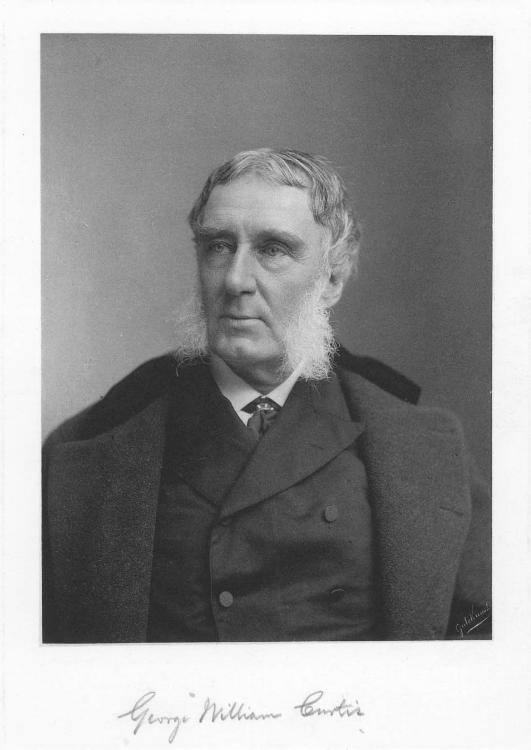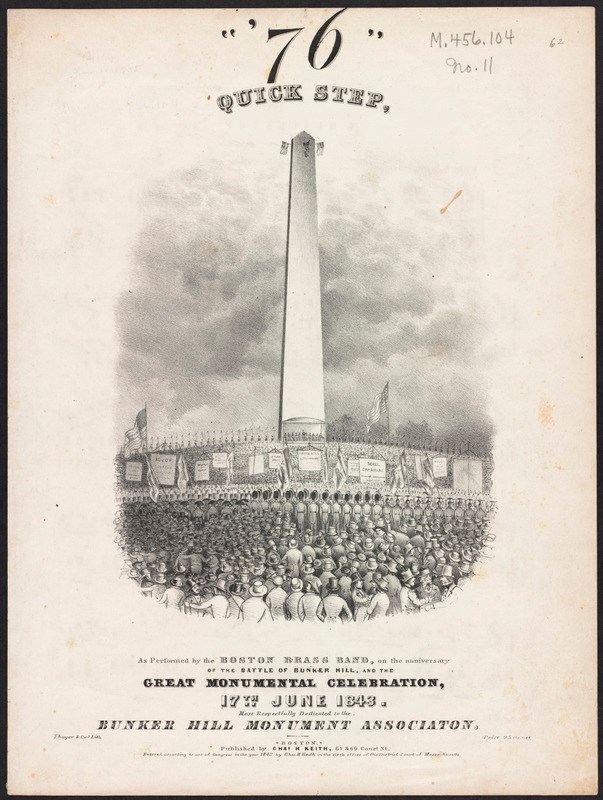Last updated: February 26, 2025
Article
Irish Claims to the Revolution
The mid and late 1800s saw major increases in immigration to both Boston and the rest of the United States. Fleeing the Potato Famine, many Irish immigrants arrived in Boston. These immigrant communities often met resistance as they began to enter into American society. As the Boston Irish community fought for a place in the United States, many staked a claim to the city's, and country's, founding history.
These immigrants felt a kinship with the early founders and a connection to the principles of the Revolution. Their claims met resistance from White Protestant citizens who tried to gatekeep their ownership of this legacy. This conflict over memory and ownership of history coincided with the centennial of the American Revolution in the 1870s. As a result, commemorations around the centennial, including that of the Battle of Bunker Hill, became significant battlegrounds over history and memory.

Ballou's Pictorial, October 31, 1857, curtesy of The Smithsonian.
Irish Immigrants and Bostonian's Reactions
By 1850, about 35,000 Irish Immigrants lived in Boston. Five years later that number reached to more than 50,000, establishing the newly arrived Irish as the largest immigrant group in the city.[1]
Across the country, many White Protestants responded negatively to this influx of immigrants. Emerging in the early 1850s, the nativist Know-Nothing party formalized these xenophobic attitudes. This party began as the "Order of the Star-Spangled Banner" which fostered anti-Catholic and anti-immigrant ideologies. When asked about the society, members responded, "I know nothing." By 1853, the order had gained notoriety and the "Know-Nothing" name stuck.[2]
The Know-Nothing party swept the 1854 elections in the North, especially in Massachusetts. Henry Gardner, a Know-Nothing candidate, won the governorship with 63% of the votes. Every member of the Massachusetts senate and all but three members of the state's General Court, or House of Representatives, belonged to the Know-Nothing Party.[3] As fast as the party rose to prominence however, its power quickly declined.
Though short-lived, the Know-Nothing party illustrates the anti-immigrant sentiments present in the 1850s. Boston's Irish Catholics continued to deal with these xenophobic attitudes for many years.

Massachusetts Historical Society
The Centennial as a battleground
By the mid-1870s the centennial of the American Revolution became a new battleground. Boston's Protestant elite felt that only those with direct ancestral lineage to the Revolution could claim ownership over it. On the other hand, ostracized groups claimed symbolic ownership over the Revolution. These groups looked to and adopted the principles of freedom and liberty espoused during the Revolution. By celebrating Irish veterans and founders, new Irish immigrants could connect to the past even without direct lineage.
On April 19, 1875, George William Curtis gave an oration at the 100th anniversary of the Battle of Lexington and Concord. Curtis worked as an abolitionist and advocate for women’s suffrage, and he belonged to the Republican party, which drew some of its support from former members of the Know-Nothing Party. Curtis still held anti-immigrant beliefs, which he highlighted in his speech.
Think, for instance, of the change wrought by foreign immigration, with all its necessary consequences. In the State of Massachusetts to-day, the number of citizens of foreign birth who have no traditional association with the story of Concord and Lexington is larger than the entire population of the State on the day of the battle… This enormous influx of foreigners has added an immense ignorance, and entire unfamiliarity with republican ideas and habits, to the voting-class.[4]
Boston's Irish Catholic newspaper, The Pilot, called out the hypocrisy of these claims. The paper criticized Curtis for implying that only direct descendants could celebrate the founding of the country.
Mr. Curtis would celebrate the centennial of the Concord fight by the descendants alone of the men who fought there. We can pity the heart that is so poor as to be unable to spare to others even a 'traditional association' with such a glorious struggle. We can smile at the impotent attempt to debar the Americans of to-day—the Irish, English, Scotch, Germans, French, Swedes — from full sympathy with the Men of the Revolution.
Unworthy descendant—if he be one—of those brave citizens, is the man who earns his bread by sowing discord and brewing religious hate—even at such a moment. Unworthy of Concord and of American strength was this mischief-making and caitiff utterance at a national celebration.[5]

Boston Public Library Arts Department
Irish Bostonians identified the upcoming centennial of the Battle of Bunker Hill, in June, as a time to assert their claim to the Revolution. They did this in part because at the time Charlestown had a large Irish Catholic community.[6] The Irish presence in this neighborhood gave Boston's Irish population a special connection to Bunker Hill. As such, Irish Bostonians put out a call to inform residents of the commemoration:
We hope to see the Irish societies well represented in the procession—not that we doubt their devotion to Republicanism, but that their presence may be a formal reproof to Geo. Wm, Curtis and his Know nothing supporters. It is to be deplored that at a time like this such better feelings should be stirred; but, now that a public orator has declared that foreign born men have no association with the men of the Revolution, it is our duty to show that in love of freedom and loyalty to the Republic, the citizens of foreign birth take no second place, while in veneration for bravery they are not bounded by race or nationality.[7]
In this strong statement, the Irish community called out their exclusion from the commemorations of the Revolution and asserted their validity in claiming this Revolutionary history. The Irish of Boston responded to this call with enthusiasm, turning out to the Bunker Hill event in great numbers. The Pilot proclaimed the commemoration "The Grandest Celebration of the Century."[8]
Continued Commemorations
Although Irish Catholic immigrants continued to face anti-immigrant discrimination throughout the 1800s, commemorations of Bunker Hill Day have remained important to the Irish community since the centennial. By 1930, "Charlestown became 'the only place on the planet,' as famously noted by actor Will Rogers, 'where the Irish celebrate a British military victory.'"[9] Today, Boston and Charlestown remain Irish hubs. Community members continue to stake their claim to the Revolution and play an active role in its commemoration.
Even now, we continue to grapple with many of the questions raised at the time of the centennial. Who is given the opportunity to see themselves represented in history, and who is left out? What does the Revolution mean to different communities? Who has a stake in its history? How can we create commemorations that invite everyone to find meaning?
As we approach the 250th anniversary of the American Revolution, these questions become more relevant than ever.
Footnotes
[1] Oscar Handlin, Boston’s immigrants, 1790-1865: A Study in Acculturation, (Cambridge: Harvard University Press, 1941), https://archive.org/details/bostonsimmigrant00hand, 56.
[2] Luke Ritter, “The Order of Know-Nothings and Secret Democracy,” in Inventing America’s First Immigration Crisis, Luke Ritter, (New York: Fordham University Press, 2021), j.ctv119907b.7.pdf (jstor.org), 83-4
[3] Ibid.
[4] George William Curtis, “Oration,” in Proceedings at the Centennial Celebration of Concord Fight April 19, 1875, (Concord: Published by the town, 1867), https://archive.org/details/concordflightapr00procrich, 112-3.
[5] “Unworthy of Concord,” The Pilot, May 1, 1875, https://newspapers.bc.edu/?a=d&d=pilot18750501-01.2.19&e=-------en-20--1--txt-txIN-------+%2c+4, 4.
[6] “By 1860 approximately 10,000 of Charlestown’s 25,000 inhabitants were Catholics—almost all Irish.” Boston’s Immigrants, 102.
[7] “To Our Irish Societies,” The Pilot, May 8, 1875, https://newspapers.bc.edu/?a=d&d=pilot18750508-01.2.15&e=-------en-20--1--txt-txIN-------, 4; While Curtis himself was a Republican, The Pilot notably calls his supporters Know-Nothing, illustrating the widespread impact of the party.
[8] “Bunker Hill Centennial,” The Pilot, June 26, 1875, https://newspapers.bc.edu/?a=d&d=pilot18750626-01&e=-------en-20--1--txt-txIN-------, 1.
[9] Elise Lemire, “The Night Vietnam Veterans Stormed Bunker Hill,” History News Network, June 13, 2021, https://historynewsnetwork.org/article/180485.
